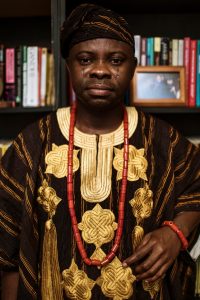Aderinto’s $300,000 Dan David Prize win
[ad_1]
THE taste of victory is particularly sweeter in the aftermath of a series of defeats. We are reminded of this paradox of human life as we celebrate the heartwarming news of the award of the Dan David Prize, “the largest history prize in the world,” to our own Saheed Aderinto, currently professor of history at Florida International University, Miami, USA.
The losses and ignominious defeats we are alluding to have nothing to do with Professor Aderinto. We speak rather of our dear country’s ongoing travails, the utter contingency and precarity of this political moment, and its well-established notoriety for snatching defeat from the jaws of victory. Yet, out of this seemingly all-embracing darkness emerges the delightful news of the bestowal of a massive honour on one of the country’s finest; one of the many, it is worth remembering, that the country has expelled and continues to expunge due to a combination of political perversity, moral cowardice and bureaucratic inanity.
The selection committee for the Dan David Prize extolled Aderinto’s for “situating African history at the cutting edge of diverse literatures in the history of sexuality, nonhumans, and violence, noting that it is exceptional to see a single person leading scholarship in all of these fields.” That Professor Aderinto deserves this award goes without saying. Still in his early 40s, he has emerged as one of the African continent’s leading historians, doing the kind of work that regular humans find too daunting and blazing the trail as a mentor to countless numbers of novitiates. Professor Aderinto has excelled in every branch of history in which he has shown interest, and the scale of his productions does not begin to do justice to the depth and originality of his scholarship. We congratulate the Ibadan, Oyo State-born historian and look forward to more from his inexhaustible fund of intellection.
In saluting Professor Aderinto, we are bound to cast a rueful glance in the direction of the history profession in Nigeria, perennially defamed and slandered by those who misunderstand it, and undermined and underappreciated even by those who do. There are too many questions looking for answers: why have all of the country’s historians fled? Why do the ones who remain no longer write monographs? So far, Professor Aderinto has written four, with another one (accompanied with a documentary) on the history and evolution of Fuji music in the works. Why has the country not been able to recapture the glory days of the Tekena Tamunos, the Obaro Ikimes, the Isaac Akinjogbins, the Joe Alagoas and the Saburi Biobakus, to name just a handful among the intellectual glitterati whose work remains the gold standard for historical scholarship?
Answers to these questions should alert the country to the patrimony it has carelessly squandered and the enormity of the task ahead. For the moment, we will savor this by raising a toast to the man fondly referred to as Emperor Saedo Okola. What else is there to do in these dark times?















Post Comment